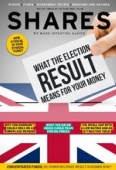Archived article
Please note that tax, investment, pension and ISA rules can change and the information and any views contained in this article may now be inaccurate.
How ethical is your ethical fund?

Almost £13bn of UK investors’ money is in ethical funds, according to the latest figures from trade organisation the Investment Association.
It’s a tiny fragment of the £1tn that is invested in UK funds in total but, for those who make the decision to invest ethically, it is important that the money is used for good.
There are a growing number of so-called ethical funds and no strict rules set down by the regulator as to what defines one.
These funds all have different strategies to investing and different criteria for picking the companies they will back; and some investors may be very surprised what their ethical fund is investing in.
Beware nasty surprises
Caroline Shaw, head of asset management at Courtiers Wealth Management, says: ‘Not all ethical funds have the same ethical standards, and investors need to do some research to make sure that the fund they pick fits their own objectives.’
Ethical investors may not like the fact the biggest investment in the L&G Ethical Trust (GB0009243824) is telecoms group Vodafone (VOD) or that AXA Ethical Distribution (GB0005297980) invests in banking group Barclays (BARC), for example.
Other investors might be uneasy to find their ethical fund backs oil giants such as BP (BP.) and Royal Dutch Shell (RDSB) or be shocked that some of the largest weightings in the FTSE4Good UK index include mining firms BHP Billiton (BLT) and Anglo American (AAL).
Shaw says: ‘This really shows the need to do your research and make sure you’re happy with the approach to ethical investing a fund takes.’
How to separate 'good' from 'bad' firms
Traditionally ethical funds have used what is known as a ‘negative screening criteria’. This means any companies engaged in specific areas of business – such as arms, tobacco or pornography – are automatically ruled out.
The funds with the strictest criteria are known as dark green funds. One of these is Kames Ethical Equity (GB00B8HVNR99), which has been run by Audrey Ryan since 1999.
She says: ‘I would argue our fund is quite traditional; we screen against 12 criteria including gambling, tobacco and alcohol. We are one of the strictest funds in the market and it won’t suit everyone.’
Ryan likes housebuilders such as Taylor Wimpey (TW.) and growing e-commerce businesses such as car sale site Auto Trader (AUTO) and online property portal Rightmove (RMV).
She surveys her investors every two years to find out what’s important to them and to see whether any changes need to be made to the fund’s criteria.
One area where there has been change is that UK retail banks such as Lloyds (LLOY) and challenger banks such as OneSavingsBank (OSB) are now allowed in the fund.
She says: ‘It doesn’t mean we have changed our thinking on banks but rather that these banks have changed their business model.’
Good business… BUT potentially contributing to obesity
Even with such a strict fund there are grey areas. Ryan invests in takeaway food delivery app Just Eat (JE.); some investors might not want to back a business which profits from the sale of unhealthy food, which is contributing to rising national obesity.
Ryan says: ‘While we are mindful of the incoming sugar tax, we don’t have a specific obesity criteria. If I try to please everyone then the number of stocks I would be able to invest in would be very small.’
One of the major problems with ethical investing is that it is incredibly personal and it can be difficult to untangle a fund’s criteria to work out how well it aligns with your own beliefs.
Two funds may both screen against alcohol but could do it in very different ways; one might just exclude firms which produce alcohol, while another could exclude any business which derives any revenue from the sale of alcohol.
Similarly, with animal testing, some funds may exclude any companies which engage in animal testing while others might not exclude pharmaceutical firms which must test on animals by law prior to introducing a drug to market.
And where some people may not want to invest in pharma giants because of animal testing, others would argue that these companies save lives by creating products to treat major diseases.
Analysis by Courtiers shows that fund groups including Kames, Old Mutual and Rathbones exclude all pharmaceutical companies because of animal testing, whereas groups such as BMO GAM and Legal & General allow pharma firms but they don’t allow other companies which use animal testing.
How do you know what your fund is investing in?
Even if you know what you are looking for in an ethical investment fund, it can be hard to fully find what’s in it.
Catherine Howarth, chief executive at Share Action, says: ‘It can be very difficult to find out what a fund is investing in – the industry is notoriously bad on transparency. But people need to check because some investors are horrified to find that they’re not just invested in Shell, it’s their biggest holding.’
'If I try to please everyone then the number of stocks I would be able to invest in would be very small'
Wider choice for investors
As this part of the industry has grown, so too has the variety of funds on offer.
Many funds now take a lighter approach to ethical investing, using a positive screening process instead. This means companies are not ruled out by what they do, but considered based on the progress they are making or some of the activities they are engaged in.
These funds are focused on what is known as ESG – environmental, social and governance factors. This is where companies are chosen based on commitment and improvement across environmental, social and governance issues.
Shaw at Courtiers says: ‘This can mean a fund includes companies which could surprise a traditional ethical investor. The BMO GAM Responsible Global Equity fund, for example, invests in Amazon.
‘I have no doubt Amazon is committed to improvement in ESG but many UK investors will have watched the Panorama feature on working conditions in its warehouses and might not feel it should be in their ethical portfolio.’
Some funds, meanwhile, use a ‘best in class approach’. Rather than ruling out entire sectors such as oil and gas, they will try to pick the ‘least worst’ company in the sector to invest in to make sure the portfolio is diversified.
The generational shift
Howarth at Share Action says: ‘There is a generation shift taking place which I think ethical funds need to do more about. In the 1980s ethical was about arms, porn and tobacco, but millennials are more interested in environmental issues and human rights. We are starting to see some funds catch up with this, but others don’t seem to reflect this new generation’s priorities.’
Chris Wright, manager of the Premier Ethical (GB0004073002) fund, uses a mixed approach, which incorporates negative screening as well as looking for positive aspects.
He says: ‘The positive criteria are always more difficult but we are trying to find companies that can make a positive difference.’
An industrial or engineering business, for example, might not be an obvious choice for an ethical fund; but if it is providing a service or product which helps to minimise waste of materials or to reduce emissions, for example, then that is clearly a good thing.
Elsewhere, Wright’s team recently ruled out investing in a travel firm which they felt had acted unethically when a customer had an accident abroad.
He says: ‘You can’t make a specific criteria or screen for something like that but we think how you treat your customers is an important part of ethics and we would not invest in a company we thought had treated a customer unethically.’
'You don't need to sacrifice investment returns to achieve a social aim'
Investing in bonds
Simon Bond is manager of Threadneedle UK Social Bond (GB00BF233915) fund, which invests in bonds issued by local authorities, charities and universities as well as listed companies. He says investing through bonds makes it easier to ensure the money he invests is being put to good use because it is often ring-fenced.
‘When you buy company shares, you are trusting the company to spend its money wisely to do the right thing but money raised for bonds is often earmarked for a specific use so it’s easier to see the evidence that it is doing some good in society.’
The bonds in the fund vary widely from those issued by not-for-profit organisations such as Motability, which provides finance for carers of disabled people so they can adapt their cars, to government organisations such as Transport For London.
‘The money in that bond targets new transport infrastructure such as the cycle superhighway, more buses and ticket hall improvements – we would say anything that improves commuters’ lives is doing good,’ says Bond.
Can you make money from ethical funds?
One of the main reasons to invest is to make money, and many investors might be concerned that ethical funds don’t generate a decent return.
Ryan at Kames says: ‘The strict criteria we use can mean we sometimes underperform, especially when defensive stocks such as pharmaceutical or tobacco companies are doing well and we cannot invest in those.
‘We can’t please everyone; all we can do is to explain what we are looking to achieve as well as we can.’
How does the performance stack up?
Over the past year, the Kames Ethical Equity fund has returned 9.5% compared to an average return in the UK All Companies sector of 21.2%.
But over five years the fund has outperformed with a return of 98.5% compared to a sector average of 85.6%.
The Premier Ethical fund has returned a hefty 136.1% over that five year period, but it too has underperformed the sector average over the past 12 months with a return of 18.4%.
The Threadneedle Social Bond fund has returned 8% over the past year, compared to an average return in the Sterling Corporate Bond sector of 9.4%. Over three years it has returned 21.1% compared to a sector average of 19.2%.
Bond concludes: ‘You don’t need to sacrifice returns to achieve a social aim. This is an investment, not philanthropy, so investors should expect the sort of return you would expect from any other corporate bond fund. The bonus is that you also know that the money is going to good causes.’ (HB)
Important information:
These articles are provided by Shares magazine which is published by AJ Bell Media, a part of AJ Bell. Shares is not written by AJ Bell.
Shares is provided for your general information and use and is not a personal recommendation to invest. It is not intended to be relied upon by you in making or not making any investment decisions. The investments referred to in these articles will not be suitable for all investors. If in doubt please seek appropriate independent financial advice.
Investors acting on the information in these articles do so at their own risk and AJ Bell Media and its staff do not accept liability for losses suffered by investors as a result of their investment decisions.
Issue contents
Big News
Editor's View
Great Ideas Update
Investment Trusts
Larger Companies
Main Feature
Money Matters
Smaller Companies
Story In Numbers
- 30% Shoe Zone’s sure-footed digital steps
- 72: WPP needs to plan for life after Sorrell
- Worst Performing FTSE Small Cap Stocks
- FTSE Small Cap Stocks
- Shareholders owning 18.4% of Gem Diamonds try to oust CEO
- Toople has lost three quarter of its value in a year
- 46,595 AIM stocks in demand
- Boohoo founder and family cash in £80m of stock

 magazine
magazine
![iStock-585307326-[Converted]](http://www.sharesmagazine.co.uk/wp-content/uploads/2017/06/iStock-585307326-Converted-475x382.jpg)










